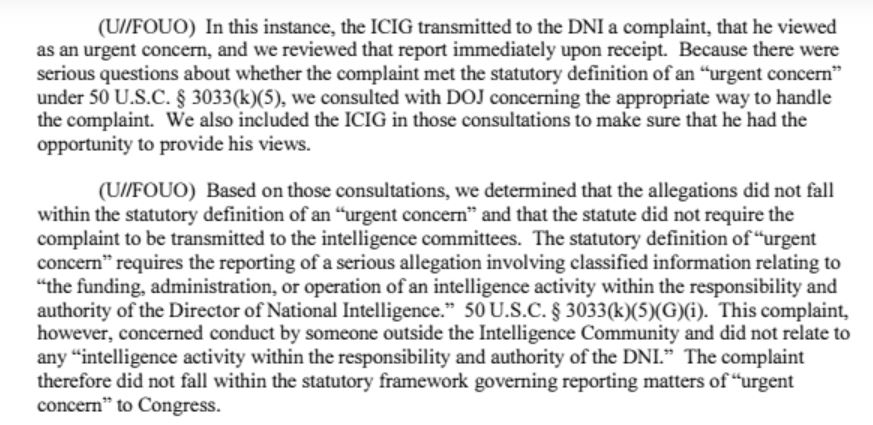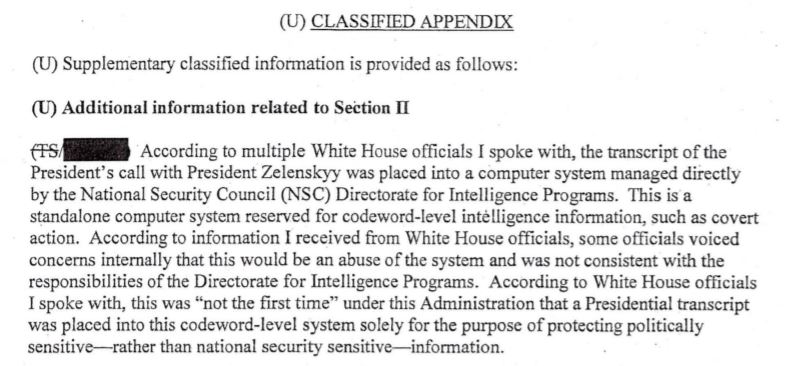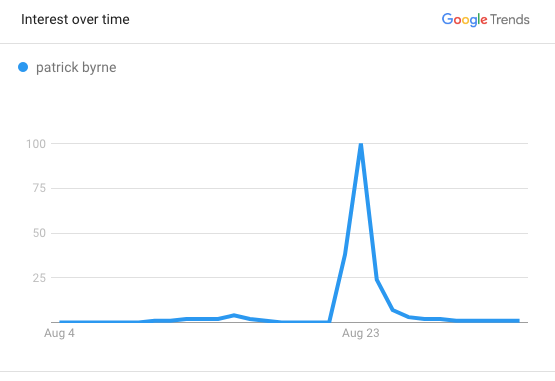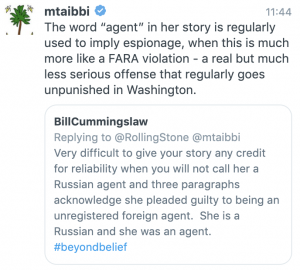Jim here.
Last night, two very remarkable stories were published that, taken together, illustrate an extreme chasm in our defense community that receives far too little attention. To set the stage, it is necessary to go back to the early 2000’s for a development that has mostly been erased from our collective memory but has had an indelible and particularly harmful and lingering effect. As the George W. Bush Administration executed its pivot from the war in Afghanistan to the invasion of Iraq, it became necessary for the Bush folks to craft a set of intelligence “facts” supporting and then sustaining the action in Iraq. A primary tool used in this effort was create a separate intelligence apparatus, since the existing intelligence agencies did not produce analyses supporting the invasion.
A huge impact of this illegal war was that it devastated morale within the military at all ranks. Sadly, many of our highest ranking–and most ethical–officers chose retirement rather than to serve while an illegal war was being waged. With the Defense Secretary, Vice President and President clearly leading the charge for the war, it seems obvious that these officers realized that their analyses showing that the invasion was not justified were falling on deaf ears and that they would never be able to inject a dose of reality into the artificial reality on which the whole war effort rested. The result, as they had to be able to foresee, was that the Iraqi people and our enlisted forces suffered unnecessary and devastating losses, with impact continuing into the present even after “end” of US action in Iraq.
By 2006, some of these retired officers even began to speak out, calling for the resignation of Donald Rumsfeld. In a normal world, where the system of checks and balances within the military and with legislative and executive oversight functions operating properly, these officers would not have needed to retire, but instead would have been key factors in rejecting the invasion as unnecessary and based only on a set of political objectives rather than an actual need for military action to stave off harm to the region. As a trained geneticist, my feeling was that this event served as a sort of genetic selection within the military, where the population of those remaining and advancing through the ranks was enriched for those who bought into distorted politics of the invasion and a willingness to shape “facts” around a desired outcome. Our only hope, I felt, was that at least some would desire to stay within the system anyway and continue to work for the ideals of their oath to the Constitution administered when they joined the military.
So, fast forward to last night. The New York Times article on Alexander Vindman illustrates that Vindman is indeed just that sort of person I hoped would continue to stay and work within the system. His work as the senior Ukraine analyst on the National Security Council put him into position to see the illegal plan that the Trump Administration was carrying out force Ukrainian President Volodymyr Zelensky to investigate Hunter Biden in return for the release of essential Ukraine aid that Trump had frozen. Vindman’s response was by the book: document the crime and then report it up the chain of command:
“I did not think it was proper to demand that a foreign government investigate a U.S. citizen, and I was worried about the implications for the U.S. government’s support of Ukraine,” Colonel Vindman said in his statement. “I realized that if Ukraine pursued an investigation into the Bidens and Burisma it would likely be interpreted as a partisan play which would undoubtedly result in Ukraine losing the bipartisan support it has thus far maintained.”
/snip/
“This would all undermine U.S. national security,” Colonel Vindman added, referring to Mr. Trump’s comments in the call.
Vindman then went on to report his concerns:
“I did convey certain concerns internally to national security officials in accordance with my decades of experience and training, sense of duty, and obligation to operate within the chain of command,” he plans to say.
He will testify that he watched with alarm as “outside influencers” began pushing a “false narrative” about Ukraine that was counter to the consensus view of American national security officials, and harmful to United States interests. According to documents reviewed by The Times on the eve of his congressional testimony, Colonel Vindman was concerned as he discovered that Rudolph W. Giuliani, the president’s personal lawyer, was leading an effort to prod Kiev to investigate Mr. Biden’s son, and to discredit efforts to investigate Mr. Trump’s former campaign chairman, Paul Manafort, and his business dealings in Ukraine.
Vindman made not one, but two reports to the top lawyer in the NSC, John Eisenberg. Were it not for the whistleblower report and the impeachment inquiry stemming from it, the sad reality is that Vindman’s heroic actions might have ended with his reports to Eisenberg, as Eisenberg has been shown to have been working to quash the efforts to expose Trump’s illegal actions. But now that the House of Representatives has finally rediscovered the real duty of oversight (we already miss you, Elijah Cummings!), Vindman today has the opportunity provide a deposition to the three committees carrying out the impeachment investigation. Vindman’s testimony seems likely to seal Trump’s fate, as it is nearly impossible to see how at least one article of impeachment won’t arise from the facts Vindman lays out. Whether Senate Republicans will also find their duty to truth rather than manufactured reality, of course, seems less likely, but at the very least it will be valuable to watch them squirm when the decision is laid squarely in their laps.
At almost the same time the Vindman article came out in the Times, Daily Beast detailed how a retired military officer, Derek Harvey, is working outside proper channels to disclose the identity of the whistleblower, endangering this individual and making future whistleblowers less likely to expose corruption. Harvey seems to be a poster child for exactly the type of officer who flourished after the mass exodus of those with a conscience. Here is how Daily Beast described his background:
Derek Harvey’s career has been extraordinary. As a Defense Intelligence Agency analyst, he played an important role in the 2007-8 troop surge in Iraq. David Petraeus kept Harvey aboard for an intelligence billet at U.S. Central Command. Harvey aligned with another member of the counterinsurgency coterie, DIA Director Mike Flynn, and followed Flynn onto Trump’s White NSC. From there, Harvey became a crucial aide to Nunes, a pivotal Flynn and Trump ally. There is no reasonable definition of Deep State that excludes Derek Harvey from elite membership.
So Harvey accelerated his military career, and career after retiring but staying within military intelligence, by joining forces with the Petraeus effort to craft “facts” around the Iraq surge–a cataclysmic failure that Petraeus always claimed as a stunning success–and then eventually joined Mike Flynn both in DIA and the NSC. One stop in Harvey’s career not on that list is detailed in Bob Woodward’s “Obama’s Wars” [quoted here]:
Based on what Harvey reported to General Petraeus, according to Woodward’s book, Petraeus “decided to create his own intelligence agency inside CentCom” (pg. 78, “Obama’s War”) to offset the shortcomings of the DNI, CIA, NSA, DIA and other US intelligence gathering agencies in gathering information about the Afghanistan-Pakistan region. He asked Harvey to draft plans for an agency modeled on Harvey’s approach. Reports Woodward, “Soon, Harvey was appointed director of the new Afghanistan-Pakistan Center of Excellence based at CentCom headquarters in Tampa, Florida.”
According to Woodward, Petraeus moved over $100 million into this project with Congress unaware of that move for several months. Harvey’s analysis that he gave to Petraeus: “the war could be won, but the U.S. government would have to make monumental long-term commitments for years that might be unpalatable with voters” (p. 79).
So Harvey clearly is essentially a ratfucker for hire, being willing to craft an intelligence set of “facts” to serve whatever master is paying him to do so. Although Woodward paints a rather admiring picture of Harvey’s diligence in approaching his intelligence gathering, comparing it to that of a homicide detective, historical context tells us that Petraeus simply didn’t like what he was getting from the existing agencies and needed his own “intelligence” to continue on his chosen path.
But, as you see above, Harvey is now working for Devin Nunes (R-Cow) and that is an especially devious team. From Daily Beast:
Derek Harvey, who works for Nunes, the ranking Republican on the House intelligence committee, has provided notes for House Republicans identifying the whistleblower’s name ahead of the high-profile depositions of Trump administration appointees and civil servants in the impeachment inquiry. The purpose of the notes, one source said, is to get the whistleblower’s name into the record of the proceedings, which committee chairman Adam Schiff has pledged to eventually release. In other words: it’s an attempt to out the anonymous official who helped trigger the impeachment inquiry.
Mark Zaid explained to Daily Beast the horrible implications of what Harvey is doing:
“Exposing the identity of the whistleblower and attacking our client would do nothing to undercut the validity of the complaint’s allegations,” said Mark Zaid, one of the whistleblower’s attorneys. “What it would do, however, is put that individual and their family at risk of harm. Perhaps more important, it would deter future whistleblowers from coming forward in subsequent administrations, Democratic or Republican.”
It’s hard to imagine two more polar opposites than Alexander Vindman and Derek Harvey. Vindman is a patriot committed to the security of the US and working within the system while Harvey is willing to sell out US security to whatever wingnut is willing to pay him and to bypass every safeguard built into the system.






